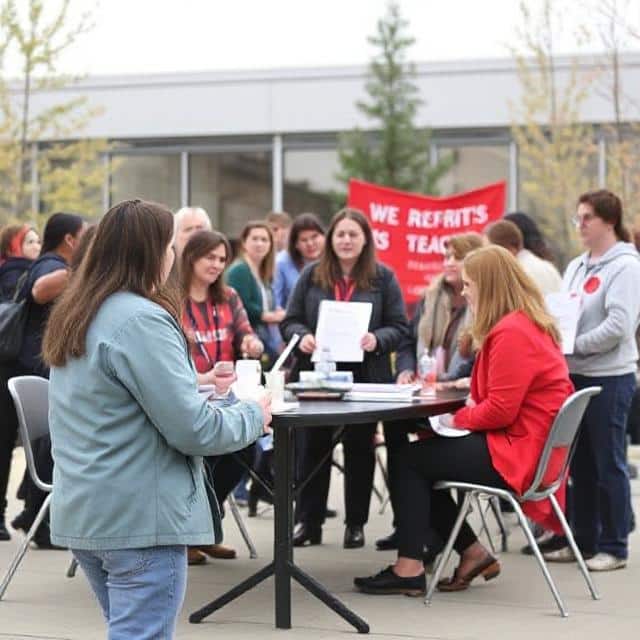Alberta Teachers Resume Negotiations with Provincial Government
Alberta Teachers Resume Negotiations Back at the Table
Alberta Teachers Resume Negotiations have officially returned to the bargaining table with the provincial government. After months of growing tension around education issues, this round of negotiations is being closely watched by teachers, parents, and students across the province.
Talks between teachers and the government are not new. They usually happen every few years when contracts need renewal. However, this time the situation feels different. Teachers say they are under more pressure than ever before. Rising costs, large classrooms, and a shortage of resources have created challenges that directly affect student learning.
The Alberta Teachers’ Association (ATA) has emphasized that the goal is not only to secure better working conditions for educators but also to improve the overall quality of education. Many parents also share these concerns, especially after the difficulties faced during the pandemic years.
Key Issues in the Negotiations
The current talks focus on several important areas:
- Salaries and Cost of Living
Teachers argue that salaries have not kept pace with Alberta’s rising cost of living. Inflation has increased the cost of housing, food, and transportation, yet teachers’ pay has remained relatively stagnant. The ATA is pushing for salary adjustments that reflect these economic realities.
- Classroom Sizes
One of the biggest concerns for teachers is the growing classroom size. In many schools, classrooms are becoming overcrowded, making it difficult for teachers to give individual attention to students. Larger class sizes can lead to more stress for teachers and reduced learning quality for students.
- Student Support and Resources
Teachers are also asking for better support for students with special needs. Many classrooms lack enough educational assistants or resources to help children who require extra care. According to educators, without proper support, these students struggle, and teachers are forced to divide their attention unevenly.
- Mental Health and Workload
Another important issue is teacher workload and mental health. Many teachers say they are burning out because of extra duties, paperwork, and long hours. The ATA wants the government to acknowledge these challenges and provide better mental health support and manageable workloads.
IOCL Recruitment 2025: Engineer Notification Released | Online Application Starts from September 1
Government’s Position
The Alberta government has said that it is committed to reaching a fair deal. Government officials recognize the important role teachers play in shaping the province’s future, but they also stress the need to balance budgets and protect taxpayers.
While details of the province’s proposals have not been made public, officials suggest they want an agreement that ensures stability in schools and avoids job disruptions. The government also claims it has already invested in hiring more teachers and staff in recent years, though teachers argue that these measures are not enough.
Parents and Students Watching Closely
For parents, these negotiations are more than just a debate over salaries. The outcome will directly impact the quality of their children’s education. Smaller class sizes, more support staff, and better teacher morale could mean a more positive school environment.
Students, too, are affected by the uncertainty. In past years, prolonged disputes have sometimes led to strikes or job actions, disrupting classes. So far, both sides have said they want to avoid that outcome.
Why This Matters
Education is one of the most important investments a province can make. Strong schools help build strong communities and prepare students for future success. If teachers feel undervalued or overworked, it can affect their ability to teach effectively.
Negotiations like these are not just about teachers’ paychecks—they are about ensuring that Alberta’s education system can continue to meet the needs of a growing population. With more families moving to the province and more students entering classrooms, the pressure on schools is only increasing.
What Happens Next?
The talks are still in the early stages, and it may take weeks before an agreement is reached. If both sides work together, a deal could be signed without any major disruptions to the school year. However, if negotiations break down, teachers may consider job action.
For now, Alberta parents, students, and teachers are hopeful that a fair solution can be found. The next few weeks will be critical in shaping the future of education in the province.
Conclusion
The Alberta teachers’ negotiations highlight the ongoing challenges in education—balancing salaries, managing classroom sizes, and ensuring that every student gets the resources they need. While both sides have different priorities, the shared goal is clear: providing Alberta students with the best possible education.
As discussions continue, everyone from parents to policymakers will be watching closely. The outcome of these talks will not only affect teachers but also shape the future of Alberta’s classrooms for years to come.
Frequently Asked Questions (FAQ)
- Why are Alberta teachers negotiating with the government?
Alberta teachers are negotiating to improve salaries, reduce classroom sizes, and secure more resources for students. They believe these changes are necessary to maintain quality education.
- What is the main issue in the talks?
The biggest issues are teacher salaries and large classroom sizes. Teachers also want better support for students with special needs.
- Will there be a teachers’ strike in Alberta?
At this stage, both sides have said they want to avoid a strike or disruption. However, if talks fail, job action is possible.
- How do these talks affect parents and students?
Parents and students are directly affected. Smaller class sizes, better resources, and teacher morale could improve the overall learning experience.
- When will the negotiations end?
Negotiations are ongoing, and no official deadline has been set. It may take weeks before a final agreement is reached.
